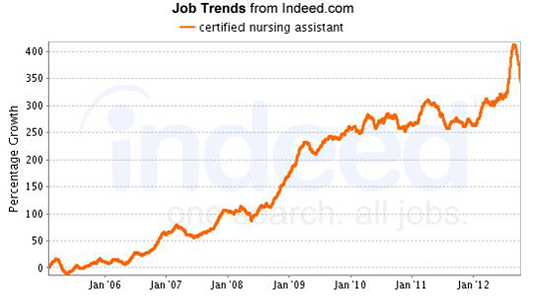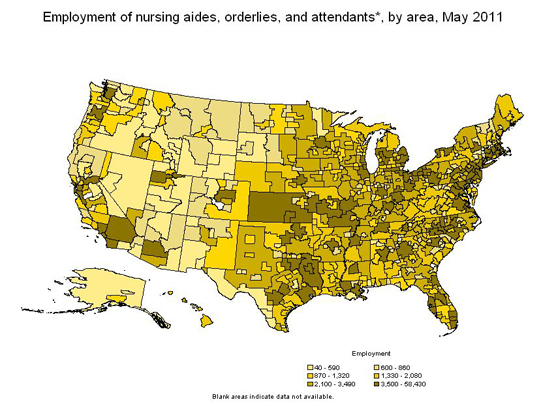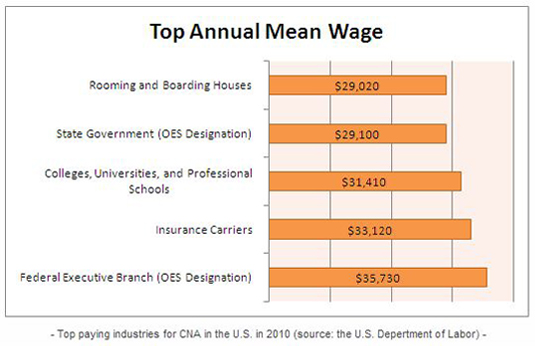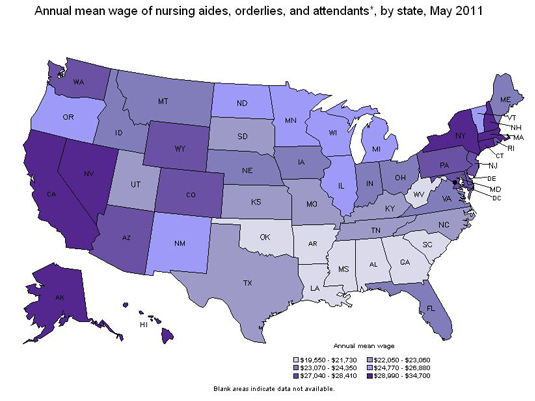CNA Salary Trends, Future Employment Prospects, & Current Industry Impacts
Enrolling in the CNA field is a great way to get into an industry which is growing by leaps and bounds, and ensure your continued marketability as a participant in the labor market for decades into the future. Indeed, every single aspect of the health care industry is booming; from doctors, to registered nurses, to CNAs, medical equipment manufacturers and more, health care is increasingly the place to be if you’re interested in securing great employment.
Reasons to Become a CNA

So why would you want to be a CNA in particular, as opposed to some of those other career paths? In general, there are a few important trends that apply to the CNA field which help make it stand out as a particularly good choice to get training in:
- Salaries trending upward – CNA salaries have been some of the fastest growing across all fields for upwards of the past decade. It isn’t hard to deduce why, if you have paid a bit of attention to politics and developments in the news. It boils down to a combination of demographics and population trends, but the long story short is that CNA wages are on the rise, have been for years, and aren’t likely to stop soon.
- Employment trends among the highest in any industry – According to the Bureau of Labor Statistics, the employment outlook for those in this field surpasses nearly every other industry in existence. The overall employment of aids, orderlies, attendants, CNAs, and other medical support staff is estimated by them to increase by over 20% by 2020.
- Continued nursing shortages expected to worsen – While most of the media coverage related to health care provider shortages has been devoted to the impending doctor crunch, it is no secret to health advocacy groups that the nation is headed for another, equally damaging development: a nursing staff shortage.

Future Employment Trends
How do these three trends impact you as someone who is considering entering the CNA field?
First, let’s take a look at some of the demographic and population trends mentioned above. It’s no secret that our population is aging; the elderly require more care than the young, and thus need more qualified CNAs. While the Boomer generation represents the largest concentration of population, they haven’t even entered in full on old age en masse.
Next, keep in mind the ever growing cost of the delivered health care itself; all the talk we have about possibly nationalizing the system is because the costs are growing higher so very rapidly. This means that there is going to be more and more money funneled into the system, which is definitely an excellent prospect in any industry you are considering entering. Wages will definitely continue to increase along with the demand for CNA services.

Finally, remember that population trends related to residency and mobility are important too. If you have suspected that a lot of people have been concentrating in our nation’s cities, it isn’t your imagination leading you to this conclusion. Indeed, people have been migrating into urban areas more and more heavily, leading us to require a distributed system of health care that requires great numbers of people in our cities, but also good coverage throughout the rest of our nation’s geographic area. This means that you have the dual benefit of being able to take advantage of places where employment is easy to obtain (the cities), but also have the option to receive higher wages for choosing non-standard living arrangements (the reason Alaska pays a premium on CNA salaries).
Obamacare to Further Increase Demand
Demographics and population trends aside, there is a lot of evidence to support the assertion that the increased demand for CNAs is an inherent feature built into our system. All data on this page related to employment trends and CNA salaries is directly pulled from the most recent Bureau of Labor Statistics reports, related to Nursing Aides, Orderlies, and Attendants. It is their assertion that this field will add nearly 300,000 positions in the next decade (and much of this data was compiled when it was still uncertain that the Patient Protection and Affordable Care Act would pass, meaning prospects have improved even further.)
With salaries trending the way they are along with the total number of jobs, as well as future projected jobs, things are looking very rosy for fresh CNA graduates indeed.

Indeed, with the upcoming doctor and nursing shortage mentioned above, prospects could even be significantly better just a few short years into the future than they are now. If that seems impossible, please consider the following:
- 32 million Americans will gain access to health care through the Patient Protection and Affordable Care Act
- The American Journal of Medical Quality estimates a nationwide shortage of 1 million nurses by 2030.
- Our educational system is turning away approximately 75,000 qualified nursing students each year due to insufficient resources and faculty.
When our nation does not even have adequate staff to ensure that all our hospitals, clinics, and educational facilities can remain in operation at peak efficiency, and then you add another 10-20% patient load on top of that, one can easily see that these trends are not likely to change much before the latter half of the century.
Consider CNA Training
So take advantage of this perfect storm, and look into enrolling in CNA training classes today at one of your local educational institutions. By doing so, you will ensure that you will have the ability to command a solid wage and earn a decent living for the rest of your life. You will also be able to directly impact the lives of others around you in your community, in one of the most important ways possible. Indeed, there is speculation in the health care community that due to a confluence of the factors discussed on this page, that our nation may even experience an entire paradigm shift when it comes to health care. In this new system, Nurses, CNAs, and physician assistants all will assume increasingly important roles as the deliverers of the vast majority of primary care, with doctors taking a more strategic and advisory role.
Hopefully we have you extremely excited about the CNA field at this point. Please, examine the rest of our site to find further resources and information, and if you decide the time is right for you to make a commitment and actually enroll in a CNA training program, we hope you let us help you select the program which will best suit your needs.
One last thing we would like you to keep in mind is that there are many, many opportunities available in the health care field. Despite the fact that we obviously focus the most on CNA classes, we also want to encourage people who are interested in other medical careers to come to us for advice as resources as well. Medical Assisting and Medical Billing & Coding are two fields which share similar growth potential to that of Nursing Assistants. So if you would love to make the same impact and directly improve peoples’ lives the way a doctor, nurse, or assistant does but from an office environment instead, we can help you explore opportunities in these fields as well. Simply contact us today or visit this page <HYPERLINK> for more information on administrative careers in the health care field.
Resources:
http://www.bls.gov/oes/current/oes311012.htm#%289%29
https://www.bls.gov/ooh/healthcare/nursing-assistants.htm
https://www.bizjournals.com/triangle/blog/2012/10/a-look-at-the-impending-nursing-shortage.html?page=all
http://www.emedicalbillingandcoding.com/medical-coder-salary/



